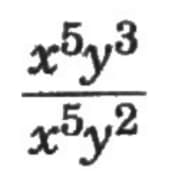Multiply:
-5(2x-6)
Answer:
-10x+30
Simplify the image below:

Answer:
y
What is the palindromic number of 2002?
Answer:
4004
Fibonacci was from _________.
A. Russia
B. Greece
C. Italy
D. Egypt
Answer:
C. Italy
Multiply:
-3b(3b-3)
Answer:
-9b2 +9b
Divide the polynomial by the monomial.
Answer:
2x7 -2x -7
What is the palindromic number of 437?
Answer:
2882
What animal helped Fibonacci recognize his sequence?
A. Elephant
B. Rabbit
C. Camel
D. Dogs
Answer:
B. Rabbit
Multiply:
(2x-6)(2x+8)
Answer:
4x2 + 4x - 48
Divide the polynomial by the monomial.
Answer:
3x6 - 8x3
What is the palindromic number of 1373?
Answer:
7117
Find the next term in the Fibonacci sequence.
1885, 3050, 4935, _______________
Answer:
7985
Multiply
(3x+4)(7x-4)
Answer:
21x2 +16x -16
Divide the polynomial by the monomial.
Answer:
-3a + 6b
What is the palindromic number of 179?
Answer:
1661
Find the next term in the Fibonacci sequence.
5490, 8883, 14373, _________.
Answer:
23256
Multiply:
(3v-4)(4v-3)
Answer:
12v2 - 25v + 12
Divide:
(9x2 + 6x) ÷ 3x
Answer:
3x + 2
What is the palindromic number of 4,835,971?
Answer:
24888842
What is the formula for the recursive relation method of fibonacci sequence?
Answer:
Fn = Fn - 1 + Fn - 2


